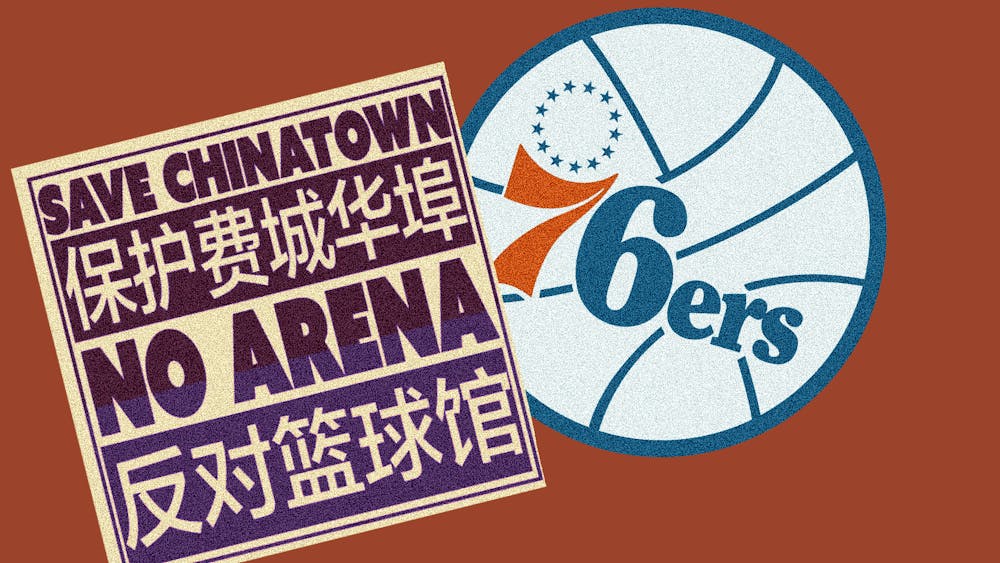Recently, a proposal for a new arena for the Philadelphia 76ers near the city's Chinatown has caused protests around Philadelphia — and Penn's campus — as different parties argue about the future of the city.
Located less than three miles from Penn’s campus, Chinatown is a cultural center of Philadelphia – a home and a resource for many Philadelphia residents and Penn students alike.
Throughout its long history, Chinatown and its residents have faced numerous challenges from groups of developers looking to redevelop Center City and the Chinatown area. Challenges have included a proposed Phillies stadium in 2000, a plan to build a casino in 2008, and, most recently, the proposal for the new Philadelphia 76ers arena at 10th and Market Streets.
On July 21, Philadelphia 76ers co-owners Josh Harris and David Blitzer, along with developer and Campus Apartments CEO David Adelman, announced the formation of 76 Devcorp and its plans to build 76 Place, a new arena for Philadelphia’s basketball team in the heart of the city's Fashion District.
The site, which the developers said in the announcement was partially selected “due to it being the most transit-rich location in all of Philadelphia,” happens to lie just one block away from the Chinatown Friendship Gate, the entrance to Philadelphia’s Chinatown.
Chinatown’s history and importance
The fight to preserve Chinatown and its land is not a new one. Over the past 50 years, Chinatown has simultaneously lost about 25% of its land to large developments, College sophomore and Students for the Preservation of Chinatown co-founder Taryn Flaherty told The Daily Pennsylvanian.
The movement to save Chinatown began around 1966, when the plan for the Vine Street Expressway extension included leveling part of the neighborhood, affecting about a quarter of the housing in Chinatown, Mary Yee, an alumna of Penn’s Master of City Planning program and the Graduate School of Education’s doctoral program in Reading/Writing/Literacy, said.
RELATED:
College Republicans, Penn YDSA back mayoral candidates while Penn Dems abstain from endorsement
Student groups present on Chinatown redevelopment, grad student financial insecurity at U. Council
Protestors went to City Council and signed petitions at City Hall to protest the plan, and a Save Chinatown film was created and shown on local channels as a public service broadcast, according to Yee.
In addition, student organizations also formed, including Yellow Seeds — which was founded by Yee and some of her classmates in 1970. Yes said that Yellow Seeds was an “anti-racist, anti-imperialist organization” dedicated to educating the community about issues pertaining to Chinatown and the surrounding community.
Although Yellow Seeds disbanded in 1975, Asian American United is essentially that group’s successor — founded in 1985 by former educator Debbie Wei, it took over Yellow Seeds’ charter, mission statement, and bylaws, and it continues to uphold and fight for them today.
In the spring of 2000, then-Philadelphia Mayor John Street unveiled a plan for a new Phillies stadium at 12th and Vine Streets to replace Veterans’ Stadium. At the time, Street called this plan “the kind of decision that establishes the city for years to come.”
Protests against this stadium included a 2000-person march to City Hall on June 8, 2000.
After significant criticism and pressure, the mayor decided that a baseball stadium downtown was “simply too expensive and too complicated to work,” according to The Philadelphia Inquirer.
In 2008, another proposal was revealed, this time to build a 3000-slot-machine casino. Around 600 people marched to City Hall for a hearing on this subject in October 2008, and the casino was never built.
“We have gone through this so many times in the history of Chinatown,” Ignatius Wong, a Chinatown resident and former protestor for the Save Chinatown movement, said. “Every time we have to fight, we have to negotiate, we have to make sure we can preserve Chinatown as a living and business neighborhood.”
Why are people protesting the proposed arena?
In addition to being a popular spot for Penn students and Philadelphia visitors to explore and patronize, “[Chinatown] is a home and a community with schools and houses and churches and small businesses,” College sophomore and SPOC organizer Kenny Chiu said.
A survey from the Philadelphia Chinatown Development Corporation, a major business-leadership nonprofit, found that 93% of business owners, 94% of residents, and 95% of visitors in Chinatown oppose the arena, according to the Inquirer.
Urban studies experts at the University agreed with protestors, saying that the development might disrupt the area.
Weitzman associate professor of City Planning and College professor of Urban Studies Domenic Vitiello said that from an urban planning perspective, almost any other form of development would be far less intrusive to residents and much more modest than an arena.
Vitiello pointed out that an arena like this one means that several thousands of people would descend on the area for each event hosted there, causing major traffic congestion.
Associate professor of City and Regional Planning Zhongjie Lin echoed this sentiment, adding how a stadium is singular use architecture that could put more burdens on an already-compressed infrastructure system.
How are students currently protesting this proposal?
One of the main organizers of the protests against the 76ers arena proposal is Students for the Preservation of Chinatown, a coalition of college students in Philadelphia and the surrounding community dedicated to fighting against the plan. Founded by students, the organization consistently holds rallies, protests, and marches against the proposed arena.
On March 3, over 50 protestors held a demonstration outside the headquarters of Campus Apartments, where Adelman is the CEO. The protest then moved to outside the Inn at Penn, where a Penn Board of Trustees meeting was taking place.
At this protest, SPOC made a number of demands to Penn. Primarily, they called on the University to cut all ties with Adelman, who sits on the Penn Medicine Board of Trustees, Blitzer, a 1991 Wharton graduate who serves on Penn’s Board of Trustees, and Harris, a 1986 Wharton graduate currently on the Wharton Undergraduate Executive Board.
They also encouraged Penn to divest funding from the corporations involved in financing the arena, end the privatization of student housing, reevaluate the Wharton curriculum, and publicly denounce the 76ers arena proposal in support of Chinatown.
“Penn is a research institution that holds weight [in Philadelphia] and can research the effects of an arena like this on a city,” Flaherty said.
The Asian Pacific Student Coalition also presented at the University Council meeting on April 19. During their presentation, they discussed the “economic and cultural cost-benefit analysis of the arena."
Chiu said that SPOC has also hosted teach-ins at colleges and high schools.
Why was this location chosen for the proposed arena?
From the developers’ perspective, the arena will “strengthen and enhance communities around Market East … and create jobs for Philadelphians across the city,” according to a statement from 76 Place’s website.
The Wells Fargo Center, the current home of the 76ers and Philadelphia Flyers, is in South Philadelphia, far from Center City but in close proximity to the Phillies' and Eagles’ stadiums. By moving the 76ers arena to 10th and Market Streets, the developers hope to “help revitalize Center City and … help public safety,” according to the statement.
The proposed arena site is also said to provide ideal access to public transportation, create economic activity for nearby small businesses, and “[follow the] successful precedent of downtown arenas in other cities,” a 76 Devcorp spokesperson wrote in an email to the DP.
They also claim that the questions being raised by SPOC and other groups “are not rooted in facts.”
“We want to make sure people know that the 76ers will not displace a single Chinatown business or resident as we are building the arena,” the spokesperson wrote to the DP. “One of the 76ers’ goal[s] is to help address the challenges and concerns within Chinatown [and] use the arena as an opportunity to support the existing community.”
The spokesperson wrote to the DP that 76 Devcorp has held over thirty meetings with groups and leaders in the community “to inform our … Community Benefits Agreement and how we address local priorities.”
“I certainly support the right to protest and express people’s views,” University City District President Matt Bergheiser told the DP. “My experience with [David] Adelman — and this is my only experience with any of the partners — is he’s on [the University City District] board and involved in the community because he cares. He cares deeply about the future of this neighborhood and about the intersection of Penn and the community here.”
What is next?
According to the NBA, the new arena is projected to open in time for the 2031-2032 basketball season. The original targeted completion date for entitlements and approvals was June 2023, according to Flaherty, but she said that protests and community backlash might push the timeline to later this fall.
The Save Chinatown Coalition will hold a march from Chinatown to City Hall on April 29 to protest the construction of the arena and advocate for Chinatown residents, according to Chiu. A similar march occurred during the Phillies stadium fight in 2000.
The city announced on April 12 that they will “independently evaluate the potential impact of the arena on the city.”
“Over the coming months, several City and public agency partners, as well as third party consultants will complete various technical studies to ascertain the feasibility and impacts of an arena in the proposed location,” Mayor Jim Kenney said in the announcement.
These studies will assess building design, urban planning, and impacts on the community, economy, parking, and traffic, according to the announcement. It also encouraged the developer groups “to ensure that those who are most directly impacted by the proposed development are involved and engaged throughout every step of this process.”
Those close to the developers said that this process of community feedback is expected.
“I tried to approach work as an economic development professional, trying to approach it objectively,” Bergheiser told the DP. “Clearly a community process needs to play out. It feels like that process is playing out, and so I think that's a good and healthy step for the city.”
SPOC organizers said the group wants to continue teach-ins and spreading the word about the issue.
The arena proposal has also impacted the mayoral primary race. On April 11, Helen Gym became the first mayoral candidate to oppose the $1.3 billion project, stating that “billionaires like [Adelman] don’t deserve public subsidies.”
So far, businessman Jeff Brown has been the only mayoral candidate to support the arena proposal. He has also been the most vocal on the subject, according to the Inquirer.
“This is not a done deal,” Flaherty said. “Chinatown is fighting and winning, but there needs to continue to be energy and discussion about it. [The developers] still have billions of dollars behind them.”








